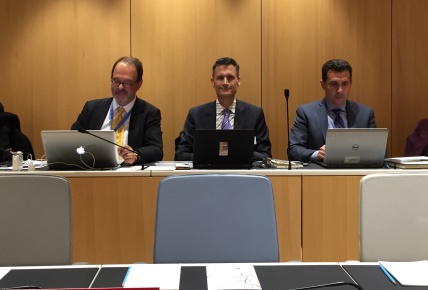
IPA Secretary General José Borghino; Director of Communications Ben Steward; and Legal Counsels Carlo Scollo Lavizzari and André Myburgh, attend the twice-yearly sittings of the WIPO as a matter of course. But from 14 to 18 November 2016 the team was joined by IPA president-elect Michiel Kolman and chair of the IPA Copyright Committee, Paul Doda. This enlarged presence attests to the growing recognition among the IPA membership of the importance of the SCCR to publishing’s long-term prospects.
The SCCR current agenda is hefty, and includes a number of items of high relevance to publishers, including limitations and exceptions in ‘educational and research institutions and for persons with other disabilities’, and ‘libraries and archives’. UN decision-making is never swift, and some items have been on the SCCR agenda for years, yet WIPO watchers sense that real, decisive progress may be achievable at the next session, from 1-5 May, 2017.
As at any multilateral, diplomatic forum, the attitudes and interventions of the national delegates at the SCCR are the overseas expression of the politics unfolding in their home countries. Broadly speaking, WIPO member state delegates can be split into the Global North, (USA, Canada, Western Europe) — developed nations largely favouring IP frameworks that promote creative industries; and the Global South (Africa, Latin America, developing Asia and the Middle East) — mainly developing nations seeking copyright reform to enable unrestricted and unremunerated access to others’ content. However, events at SCCR 33 suggest that the variances of world politics may be starting to blur these lines.
For instance, Global South heavyweight Brazil altered tone slightly at SCCR 33, after Singaporean Professor Daniel Seng presented the findings of his 1009-page study into copyright limitations and exceptions for educational activities in all 189 WIPO member states. Prof. Seng found that all 189 countries have at least one exception or limitation provision for education, and that in total there are no less than 1,553 separate provisions across the WIPO membership.
The headline message of the study for all but the most blinkered of anti-copyright evangelists was that national governments around the world have already conceived of myriad ways to bypass copyright legally so that educators can do their job properly. This raises the question: what use is an international legal instrument to regulate something that is already being competently managed at national level?
It was the Iranian delegate who asked the professor precisely this question during the closing Q&A of the SCCR, inquiring: ‘Is harmonization of national legislation for exceptions and limitations for research and education necessary, or not?’
Sidestepping the invitation to voice an opinion — strictly verboten for a commissioned agent of fastidiously neutral WIPO — Prof. Seng answered: ‘This study places before the delegates a bird’s eye view of every world jurisdiction; you can now decide which policies best suit Member States for your own implementation … What we’ve done is open this tool for Member States to take national legislation to the next step.’
In other words, the world’s legislators now have before them a comprehensive menu of exceptions and limitations provisions upon which to base their own national solutions, should they require. This nation-by-nation approach squares neatly with the recommendations of the IPA’s Educational Publishers Forum, which stresses that the best education is necessarily local — bringing together local writers to create local content that responds to local curricula and is produced by locally-based publishers — principles made clear in the IPA statement submitted to the SCCR.
In previous SCCRs Brazil’s utterances have sought the dilution of copyright through additional exceptions and limitations in various fields of application, including education, sparing little thought for Brazil’s considerable creative sector.
Against this backdrop, the recent on-the-record statement by Brazil’s representative in Geneva was refreshingly moderate. He said: ‘In Brazil, [Prof. Seng’s] report will provide us with much food for thought in our ongoing internal debates about copyright law reform.’
While perhaps too early to tell, this promising evolution in tone may indicate a change of tack in Brazil’s IP strategy, and as Brazil is a very important member, even a minute modification now could mean a great deal later at WIPO.
For day-by-day reports on the SCCR session, read the IPA WIPO Diary:
Day 1: Treaties, transitions and Trumpism
Day 2: The greater good
Day 3: A world of exceptions and limitations
Day 4: A way with words
Day 5: Moving on

